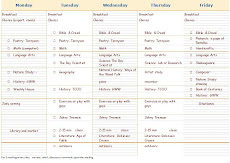To start off with where we seem to be right now. First, Aidan and reading.
Aidan seems to be at a "sensitive period" for words. Every day he asks me to write down all the words he knows -- he lists them for me: zipper, zebra, quiet, queen, dog, hippo, giant, sun, bus, top, tent, etc. Then he reads them to himself. Then he says, "Can I take them to bed with me?"
He spells every word he sees in his environment. Recently he has gotten interested in 100 Easy Lessons and will spell out words "MAD" and ask me what they mean. This reminds me of what I read in The Montessori Method not too long ago:
Now, where I need to catch up in my understanding of the Montessori method is in the idea that writing ought to come before reading. Certainly Aidan is "writing" in the sense that he will take his wooden or magnetic letters and form words he has memorized. Perhaps this is enough to expect of a child with motor difficulties. However, I would like to see both him and Paddy writing, and delighting in writing.One of our most interesting discoveries was made in the effort to devise a game through which the children might, without effort, learn to read words. We spread out upon one of the large tables a great variety of toys. Each one of them had a corresponding card upon which the name of the toy was written. We folded these little cards and mixed them up in a basket, and the children who knew how to read were allowed to take turns in drawing these cards from the basket. Each child had to carry his card back to his desk, unfold it quietly, and read it mentally, not showing it to those about him. He then had to fold it up again, so that the secret which it contained should remain unknown. Taking the folded card in his hand, he went to the table. He had then to pronounce clearly the name of a toy and present the card to the directress in order that she might verify the word he had spoken. The little card thus became current coin with which he might acquire the toy he had named. For, if he pronounced the word clearly and indicated the correct object, the directress allowed him to take the toy, and to play with it as long as he wished.
When each child had had a turn, the directress called the first child and let him draw a card from another basket. This card he read as soon as he had drawn it. It contained the name of one of his companions who did not yet know how to read, and for that reason could not have a toy. The child who had read the name then offered to his little friend the toy with which he had been playing. We taught the children to present these toys in a gracious and polite way, accompanying the act with a bow. In this way we did away with every idea of class distinction, and inspired the sentiment of kindness toward those who did not possess the same blessings as ourselves. [Page 300] This reading game proceeded in a marvellous way. The contentment of these poor children in possessing even for a little while such beautiful toys can be easily imagined.
But what was my amazement, when the children, having learned to understand the written cards, refused to take the toys! They explained that they did not wish to waste time in playing, and, with a species of insatiable desire, preferred to draw out and read the cards one after another!
I watched them, seeking to understand the secret of these souls, of whose greatness I had been so ignorant! As I stood in meditation among the eager children, the discovery that it was knowledge they loved, and not the silly game, filled me with wonder and made me think of the greatness of the human soul!



No comments:
Post a Comment